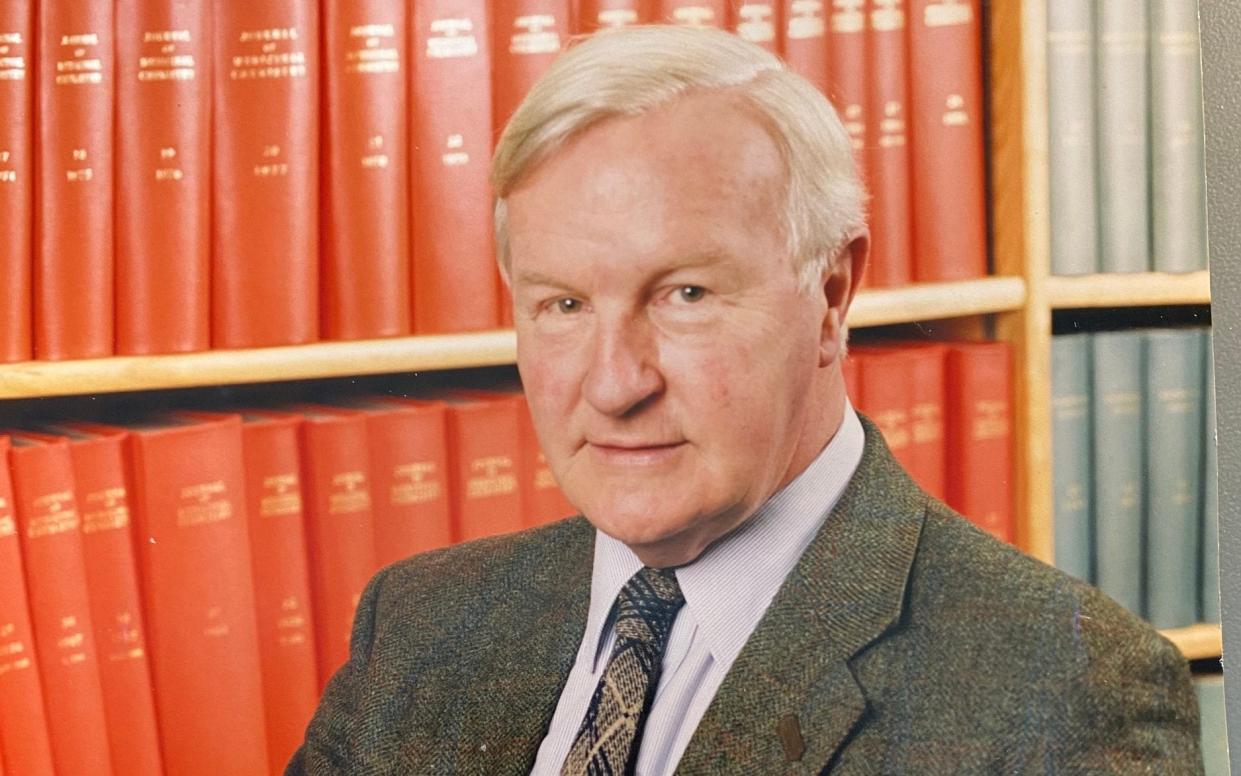Leslie Iversen, pioneering neuroscientist who studied the effects of drugs on the brain – obituary

Leslie Iversen, who has died aged 82, was a neuroscientist and pharmacologist who led an outstanding generation of researchers, making sizeable contributions to the study of chemical neurotransmitters, revealing how antidepressant and antipsychotic drugs affect the brain; towards the end of his career he chaired the Advisory Council on the Misuse of Drugs.
His early work focused on noradrenaline and dopamine, which are types of catecholamines, or neurotransmitters. He then studied amino acids (GABA and glutamate), and later neuropeptides, discovering compounds that would transform psychiatry and neurology. In 1982 he moved to the industrial sector as director of the Merck, Sharpe and Dohme Neuroscience Research Centre at Harlow.
Leslie Lars Iversen was born in Exeter on October 31 1937 into a family of Danish origins; his mother was named Anna, while his father Svend was a UK representative for Danish Bacon. Leslie attended Hele’s School in Exeter – then a grammar school, now a comprehensive – then went up to Trinity College, Cambridge, to study Biochemistry; he won a place apparently thanks to his plant-naming abilities, and he remained a passionate gardener all his life.
After gaining a doctorate in pharmacology, studying peripheral sympathetic neurons, from 1964-65 he worked as a Harkness research fellow with Julius Axelrod, the Nobel Prize-winning biochemist, at the US National Institute of Health.
There, he studied the re-uptake mechanisms that regulate the levels of noradrenaline synapses in the brain, building on his PhD work at Cambridge. These mechanisms were subsequently shown to be crucial for understanding the actions of antidepressant drugs as well as drugs of abuse.
He was housed in what he recalled as “three rather small rooms” with two other scientists who were to become leaders in the field, Solomon Snyder, joint discoverer of the opioid receptor, and Jacques Glowinski, who was to ascertain the functions of dopamine in the frontal lobes of the brain. This triumvirate came to exert enormous influence on the burgeoning field of molecular neuropharmacology.
After a year with Axelrod, Iversen moved on to Harvard Medical School to work for a year in the laboratory of the Hungarian-American neurophysiologist, Stephen Kuffler, where he focused on a new candidate neurotransmitter, GABA, which came to be acknowledged as the most important inhibitory transmitter in the mammalian brain.
Iversen returned to Cambridge as a Locke Research Fellow, then in 1971 he was appointed director of the Medical Research Council’s new Neurochemical Pharmacology Unit in Cambridge – NCPU, often referred to as “Nick-Pooh”.
Over the next dozen years, the unit became one of the leading centres for neuroscience, training many future practitioners. Iversen helped to initiate the study of a new class of neurotransmitters, the neuropeptides, while other pioneering projects included investigating the neurochemical basis of Alzheimer’s disease, Huntington’s disease and schizophrenia, as well as the mechanism of antipsychotic drugs.
The NCPU housed an intellectually brilliant group of often contrasting personalities that were kept focused and in harmony by Iversen’s quiet but firm managerial style. At the core was his intellect and discipline – manuscripts were ruthlessly given the red biro treatment and absolute rigour was required in the lab.
But memories of group lunches at the Queen’s Head at Newton with roast beef sandwiches and half-pints of bitter, and soirées at the Iversen’s home, made it a heady social-networking opportunity for young scientists to meet the world’s finest. With his wife Susan Iversen, the psychologist and neuroscientist, Iversen hosted an academic Camelot for neuroscience.
The drive to make drugs to improve the lot of those afflicted by with mental illness – as well as the promise of increased resources – led the Iversens to leave Cambridge in 1983 and to help found and direct the Merck Neuroscience Research Centre in Harlow, Essex.
Working with a team of medicinal chemists and clinicians in the commercial setting of “Big Pharma”, the Iversens had great successes, but they also became all too acquainted with the problems that bedevil the search for new drugs for mental illness. One drug in particular, MK-801, initially looked like a boon for the treatment of strokes, but was shown to produce minor brain cellular dystrophy in animal studies and mild psychotic symptoms at high doses in humans.
Whether these counter-indications tipped the risk-benefit analysis the wrong way or not was immaterial for the conservative policies of the regulatory authorities, and the drug went no further. However, it did become an invaluable tool for neuroscientists investigating the processes of learning and neural plasticity, and a clue to the mechanisms of schizophrenia.
Other projects included work on the neuropeptide Substance P, which became licensed in the treatment of nausea in cancer sufferers.
In 1995 Iversen became Visiting Scientist, and then Visiting Professor, in the Department of Pharmacology at Oxford University, where two years earlier his wife Susan had become professor and head of the department of experimental psychology. He also had consultancies with biotech companies and became Director of the Wolfson Centre for Age-Related Diseases at King’s College London.
With Susan, and his long-time friend and American colleague Floyd Bloom, Iversen wrote An Introduction to Neuropsychopharmacology (2009). He also produced monographs on marijuana and stimulant drugs; his interest in the former arose when he became a consultant to the Government on cannabis and its possible medicinal benefits. This in turn led him to join and chair the UK Advisory Council on the Misuse of Drugs at the Home Office.
Having to deal with the new wave of drugs providing “legal highs” required his knowledge of molecular mechanisms of drug action, as well as his safe pair of hands to guide the committee towards a rational approach to regulation.
Iversen was appointed CBE in 2013. He is survived by Susan, whom he married in 1961, and by their daughter and son.
Leslie Iversen, born October 31 1937, died July 30 2020


